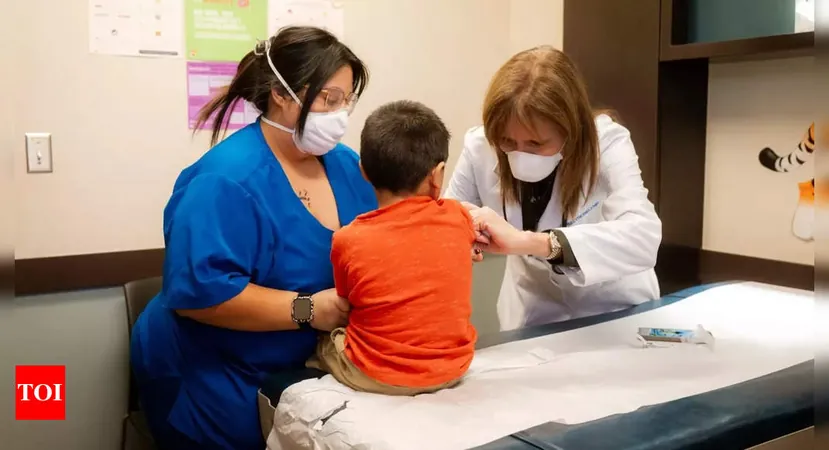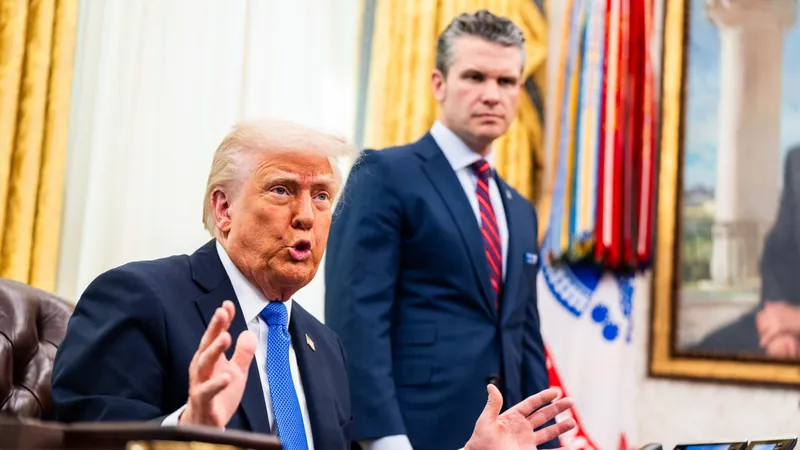
The Shocking Consequences of RFK Jr.'s Vitamin A Claims During the Measles Outbreak
2025-03-27
Author: Amelia
The United States is currently facing a severe measles outbreak, marking the worst in 25 years, spurred by a significant number of unvaccinated children. Prominent anti-vaccine figure and Secretary of Health RFK Jr. has controversially advocated for Vitamin A as a remedy for this preventable disease, leading to concerning health issues among infected children.
Despite the proven effectiveness of the measles, mumps, and rubella (MMR) vaccine—which offers approximately 97% protection after two doses—many parents have been swayed by RFK Jr.'s misleading claims about Vitamin A, fostering a dangerous trend of alternative treatments to vaccinations.
During a recent Fox News interview, RFK Jr. described Vitamin A as an “almost miraculous and instantaneous recovery” method for measles. Unfortunately, evidence suggests that while Vitamin A can indeed help reduce mortality rates in children suffering from measles, it does not prevent infection and is intended to be administered in controlled doses to hospitalized patients, not as a preventive measure.
What has been the result of this push? Katherine Wells, director of public health in Lubbock, Texas, where the outbreak began, noted, “I did not hear anything about Vitamin A until he said it on television.” This statement captures the essence of the issue; RFK Jr.'s influence has led to widespread misconceptions and the misuse of Vitamin A among vaccine-skeptical parents.
Recent reports highlight the alarming consequences of this misguided approach. Overuse of Vitamin A, particularly in unregulated quantities, has led to severe health issues such as liver damage and skin yellowing in infected children. Experts caution that unlike other vitamins, excess Vitamin A is retained in the body’s fat, leading to a risk of toxicity. Symptoms of Vitamin A overdose include headaches, nausea, and significant health degradation, especially troubling in a young, developing population.
Summer Davies, a pediatrician in Lubbock, expressed her concerns: “I had a patient that was only sick a couple of days, four or five days, but had been taking it for like three weeks.” This underscores the potential dangers of extended, unmonitored use of Vitamin A as an alternative to established medical treatment.
In a baffling response to the outbreak that has already resulted in one child's death and numerous hospitalizations, RFK Jr. has escalated his support for Vitamin A by dispatching supplements to Texas. This move has only intensified the public health crisis, as doctors continue to emphasize the necessity of the MMR vaccine in effectively preventing outbreaks like this one.
The World Health Organization does acknowledge Vitamin A's role in addressing deficiencies associated with severe measles cases, yet they recommend strict short-term doses for affected children, not preventive measures in healthy, uninfected individuals.
As public health officials strive to combat misinformation, the alarming reality remains: children in affected regions, particularly in West Texas, are falling ill from a disease that was once considered eradicated in the U.S. The importance of vaccinations cannot be overstated; with effective community vaccination rates above 95%, the spread of measles can be effectively thwarted.
In summary, the ongoing measles crisis emphasizes a critical need for robust public education on the importance of vaccinations, while also highlighting the dangers of alternative remedies promoted without scientific backing. Measles, which can lead to life-threatening complications, especially in unvaccinated populations, demands appropriate prevention methods—namely, vaccinations—to safeguard future generations.









 Brasil (PT)
Brasil (PT)
 Canada (EN)
Canada (EN)
 Chile (ES)
Chile (ES)
 Česko (CS)
Česko (CS)
 대한민국 (KO)
대한민국 (KO)
 España (ES)
España (ES)
 France (FR)
France (FR)
 Hong Kong (EN)
Hong Kong (EN)
 Italia (IT)
Italia (IT)
 日本 (JA)
日本 (JA)
 Magyarország (HU)
Magyarország (HU)
 Norge (NO)
Norge (NO)
 Polska (PL)
Polska (PL)
 Schweiz (DE)
Schweiz (DE)
 Singapore (EN)
Singapore (EN)
 Sverige (SV)
Sverige (SV)
 Suomi (FI)
Suomi (FI)
 Türkiye (TR)
Türkiye (TR)
 الإمارات العربية المتحدة (AR)
الإمارات العربية المتحدة (AR)